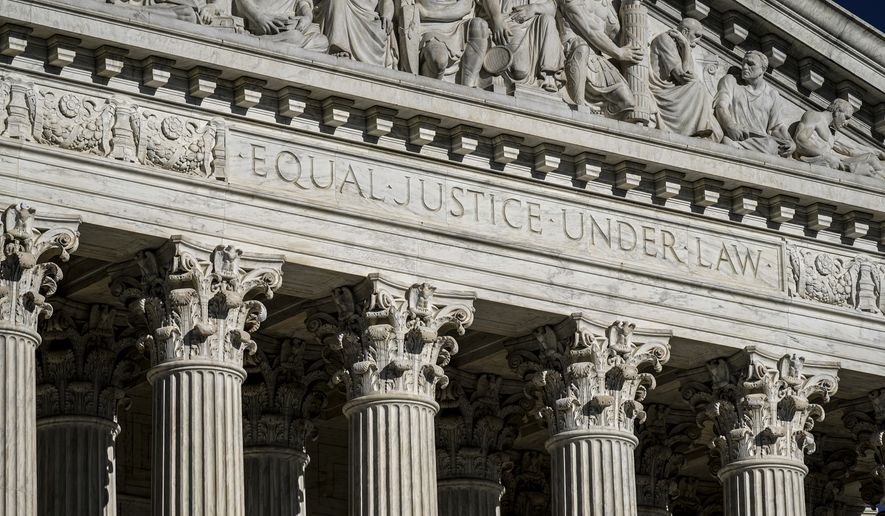The Supreme Court struggled Tuesday over which side’s argument would have the biggest consequences in a legal battle over a $15,000 tax bill that could potentially upend part of the 2017 tax reform law passed by Congress and signed by then-President Trump.
Charles and Kathleen Moore’s case centers on unrealized profits from investments in a foreign company.
In 2006, they invested in a friend’s business, KisanKraft Machine Tools Private Ltd., which serves rural farmers in India. The Moores put up $40,000 for a 13% share in the company. They said they never realized any profits because the money was always reinvested to help the company grow.
But in 2018, they were told they owed money to the federal government as part of the mandatory repatriation tax, part of the Tax Cuts and Jobs Act of 2017. They were taxed on a proportion of their ownership dating to 2006, producing a tax bill of $14,729.
They said the bill runs afoul of the 16th Amendment, which allows Congress to tax personal income, because they never received the profits from their investment and thus it’s not “income.”
Andrew M. Grossman, the lawyer representing the Moores, said that unless investment gains are cashed in (“realized” in finance-speak) they should not count as income.
“Without realization, there is no limiting principle,” he said. “The court should reaffirm there is no income without realization.”
A ruling for the Moores could undo the mandatory repatriation tax. Some tax experts say that could potentially affect how other corporations like partnerships and limited liability companies are taxed.
That was also a concern from some of the justices during Tuesday’s oral arguments.
“It’s Subpart F, it’s S Corporations, it’s partnerships, and it’s taxing on an accrual basis. So give me why it is that you think we can decide for you, without putting any of those kinds of very established taxation schemes at risk,” Justice Elena Kagan asked the Moores’ attorney.
But a ruling for the government, some justices worried, would let the federal government issue a tax on one taxpayer for another taxpayer’s gain — or to create new tax schemes.
“If the only bar to Congress from enacting a tax on millions of Americans’ retirement accounts and mutual funds is administrability, they’re pretty clever over there, aren’t they?” said Justice Neil M. Gorsuch.
U.S. Solicitor General Elizabeth B. Prelogar said Congress can set out how to tax certain gains and argued that taxpayers don’t have to acquire income for it to be taxable.
“There is no bright line realization rule or requirement under the 16th Amendment,” she said.
Justice Samuel A. Alito Jr. raised concerns with the limits of both parties’ positions. “I still want to understand the limits of your argument,” he told the solicitor general.
“You say that if we rule in [the Moores’] favor, then large, important pieces of the Tax Code will also logically fall. And I think that’s a fair argument. But I think it’s also a fair argument to do the same thing with your position, and I want to understand the limits of your position,” he said.
Justice Sonia Sotomayor noted that defining income — or when it is realized — was a moving target. “Nobody is happy with anybody’s definition,” she said.
The 9th U.S. Circuit Court of Appeals had ruled against the Moores, reasoning that income doesn’t have to be realized to be taxed under the Constitution and that shareholders can be taxed on their portion of a corporation’s profits, not only on the individual’s direct income.
The federal government argues that the 16th Amendment gives Congress the power to collect taxes from income “from whatever source derived.”
The central question for the justices is what constitutes “income.”
Experts say the Supreme Court ruling for the Moores could nullify the so-called wealth tax. The Mandatory Reparation Tax was intended to apply to investors with a 10% or greater share in a corporation as a one-time tax. It was expected to generate roughly $340 billion in revenue, according to The Associated Press.
The Moores own 13% of their friend’s foreign company.
In hearing the Moores’ case, the high court will look at the 1920 Eisner v. Macomber ruling, in which justices decided that taxing unrealized gains is unconstitutional. That case has never been overruled but also has not been applied as tax laws have evolved.
Chief Justice John G. Roberts Jr. suggested at one point during Tuesday’s hearing that the federal government wanted to do away with the Macomber ruling.
“It also has been recognized … at least in the beginning, before it certainly narrowed over time, as standing for the proposition that the government cannot tax the appreciation in property,” he said to the solicitor general.
“You’ve taken that off the board in your presentation today. So I wonder if you can give us a little more view or assurance in what’s left to defend that proposition” without overturning Macomber outright, the chief justice added.
A ruling in Moore v. United States is expected by the end of June.
• Alex Swoyer can be reached at aswoyer@washingtontimes.com.




Please read our comment policy before commenting.